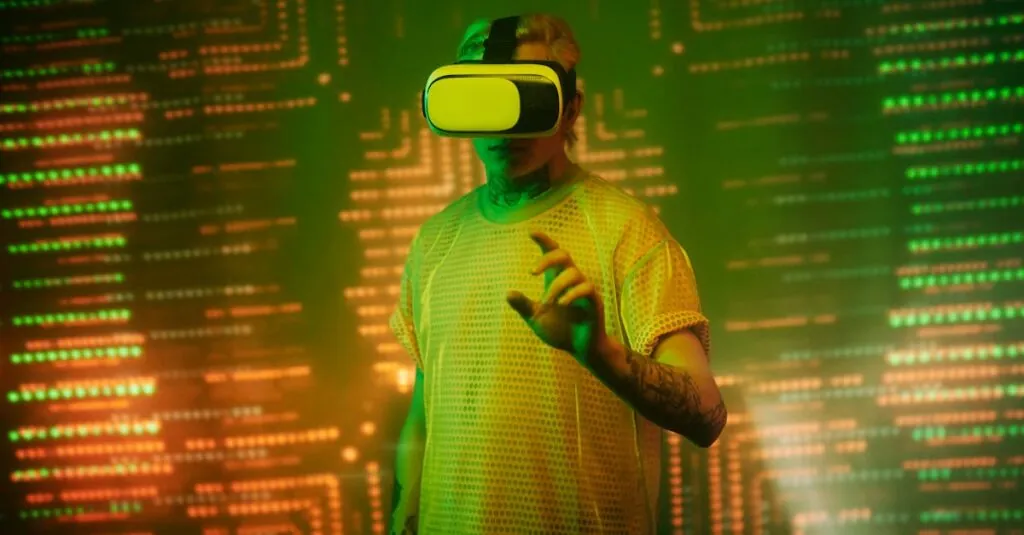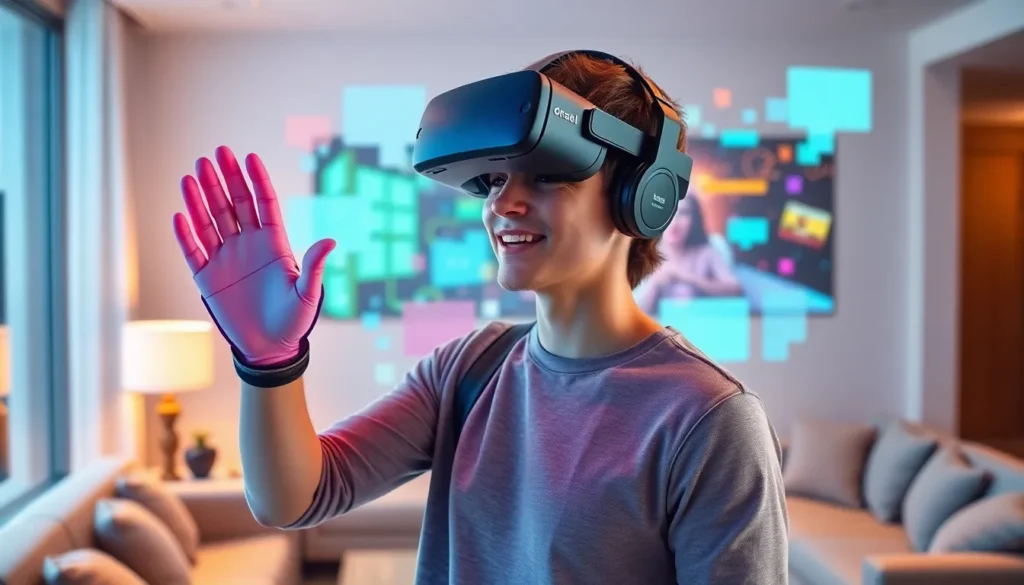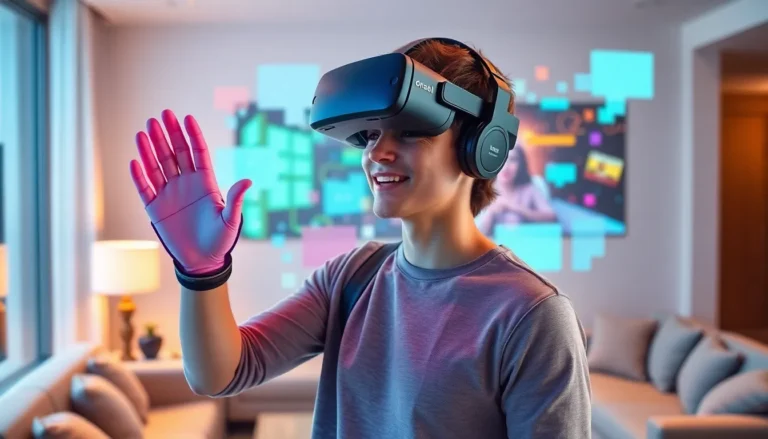Table of Contents
ToggleVirtual reality isn’t just for gamers anymore; it’s the gateway to a future that’s as thrilling as it is mind-bending. Imagine slipping on a headset and stepping into worlds where the impossible becomes possible. From exploring distant planets to attending concerts with friends in a digital amphitheater, VR technology is about to redefine how we experience life.
Overview Of VR Future Technology
Virtual reality technology continues to advance rapidly. Enhanced user experiences emerge through improved graphics, higher resolution displays, and more responsive tracking systems. Companies invest significantly in research and development, leading to innovative applications in diverse sectors.
Healthcare benefits from VR through surgical simulations and patient therapies. Educators use virtual environments to create immersive learning experiences, helping students grasp complex concepts. Businesses adopt VR for virtual meetings and collaborative workspaces, increasing productivity among remote teams.
Entertainment remains a vital area for VR growth, expanding into interactive storytelling and immersive video experiences. Developers create diverse gaming genres that engage players in unprecedented ways. Future advancements may include AI integration, further personalizing experiences for users.
According to industry analytics, the VR market is projected to reach $57.55 billion by 2027. This growth reflects the technology’s increasing accessibility and the rising demand for VR applications beyond gaming. As the technology evolves, possibilities for creative expression, business innovation, and societal impact will grow.
In education, learners could participate in virtual field trips, enhancing overall engagement. Workers may experience hands-on training in a safe, controlled environment, reducing the risk of real-world errors. Communities might host virtual social events, bridging distances between people more than ever before.
Amid all advancements, ethical considerations must remain a priority. Developers face crucial decisions regarding user privacy and the potential effects on mental health. Addressing these issues ensures a responsible approach to VR technology with long-term benefits for society.
Current Trends In VR Technology
Virtual reality technology is advancing at a remarkable pace, transforming the landscape of multiple industries. Current trends reveal notable progress in both hardware and software innovations.
Advances In Hardware
New VR headsets feature higher resolutions and improved refresh rates, enhancing visual clarity and immersion. Manufacturers are integrating better tracking systems that ensure precise motion detection in real time. Portability is another focus, with wireless models expanding user freedom. Advanced haptic feedback devices offer users tactile sensations, deepening the engagement experience. According to industry reports, the VR headset market is projected to reach $16 billion by 2025, driven by the demand for high-quality immersive experiences.
Innovations In Software
Software development in VR is witnessing a surge in creativity and functionality. Game developers create interactive environments that offer unique storytelling formats and engaging gameplay. Educational platforms are evolving with immersive learning tools designed to increase retention of complex subjects. In the corporate realm, businesses harness customized VR applications for training simulations, enhancing workforce skill development. By incorporating artificial intelligence, software can adapt experiences to individual preferences, further personalizing user interaction. This growing trend suggests VR software innovation isn’t just about entertainment; it also plays a crucial role in improving productivity and engagement across sectors.
Applications Of VR Future Technology
Virtual reality (VR) technology presents a multitude of applications across various sectors. Each area stands to gain unique benefits from this dynamic innovation.
Education
VR transforms education by creating engaging, immersive learning experiences. Students explore complex topics within interactive environments that enhance understanding. Teachers utilize VR simulations for subjects like history and science, offering virtual field trips and experiments. This kind of learning has proven to improve information retention rates significantly. Increasing engagement in the classroom becomes easier when students participate in real-world scenarios without leaving their seats. Educational institutions investing in VR technology report higher overall satisfaction among both students and instructors.
Healthcare
In healthcare, VR plays a crucial role in training and patient care. Medical professionals use VR for surgical simulations, honing their skills in safe, controlled settings. Therapists leverage VR to treat phobias and anxiety disorders, allowing patients to confront fears gradually. Studies indicate that VR therapy can reduce treatment time by as much as 30%. Patients undergoing rehabilitation enjoy gamified experiences that motivate physical activity. Overall, VR enhances patient understanding of procedures, increasing comfort levels before actual treatments.
Entertainment
Entertainment remains a leading sector driving VR advancements. Gamers experience unprecedented immersion through interactive storytelling and realistic environments. Developers across the industry create diverse genres, from adventure to mystery, engaging players like never before. VR concerts and events attract audiences who enjoy participating in live experiences from home. Statistical projections estimate that the VR gaming market alone will reach $57.55 billion by 2027. Continued innovation ensures that both casual and serious gamers will enjoy new, captivating experiences for years to come.
Challenges Facing VR Future Technology
Virtual reality technology faces several significant challenges that may hinder its potential growth and widespread adoption.
Technical Limitations
Current hardware limitations pose a challenge to VR experiences. Many users encounter issues with motion sickness due to lag in visual synchronization or inadequate frame rates. Weight and bulkiness of headsets often lead to user discomfort during extended use. Connectivity remains an obstacle, as high-bandwidth requirements restrict user mobility. Additionally, expensive equipment can limit access for many consumers and businesses, delaying broader market penetration. As manufacturers strive to develop more advanced systems, addressing these technical constraints is essential for seamless integration into daily life.
Ethical Considerations
Ethical concerns around VR technology cannot be overlooked. User privacy issues frequently arise, with potential data misuse fostering distrust among consumers. Psychological effects, such as addiction and disorientation, may negatively impact mental health. Age restrictions create additional complexities, as content designed for mature audiences raises questions about appropriate access for younger users. Developers and companies must prioritize responsible practices, ensuring that VR experiences enhance user well-being while adhering to ethical standards. A balanced approach to innovation and responsibility is crucial for the sustainable growth of VR technology.
The Potential Impact Of VR Future Technology
Virtual reality technology is shaping various sectors and experiences significantly. Healthcare professionals utilize VR for surgical training and patient therapy, improving understanding and care quality. Educators create immersive environments that enhance learning retention, making complex subjects more accessible.
Businesses gain productivity by adopting VR for virtual meetings and collaborative workspaces, thus fostering better team engagement. Enhanced storytelling and interactive experiences in entertainment redefine how consumers interact with media. The gaming industry continues to thrive, with immersive VR titles driving substantial interest and revenue growth.
By 2027, the VR market is set to reach $57.55 billion, highlighting its expanding presence beyond gaming. Innovative applications are emerging, powered by strong investments in research and development. Enhanced user experiences are characterized by improved graphics and responsive tracking, welcoming a new era for VR interactions.
Current VR hardware innovations focus on portability, with wireless models providing greater freedom. The projected growth of the VR headset market, reaching $16 billion by 2025, emphasizes increased user demand for quality experiences. Advanced software development contributes to dynamic environments, integrating artificial intelligence for personal user interactions.
Ethical considerations must guide the development of VR technology, addressing user privacy and mental health effects effectively. Responsible practices ensure that VR experiences promote well-being while driving the industry’s sustainable growth. Balancing innovation with ethical responsibility is crucial for maximizing the positive impact of VR on society.
The future of virtual reality technology holds immense promise across various sectors. As advancements in hardware and software continue to evolve, the potential for immersive experiences is expanding rapidly. From enhancing education and healthcare to transforming entertainment and business operations, VR is set to redefine how individuals interact with their environments.
However, as the technology progresses, ethical considerations must remain at the forefront. Prioritizing user privacy and mental well-being is crucial for fostering a responsible VR landscape. With careful attention to these aspects, the growth of VR can lead to significant benefits for society, enriching lives and creating new opportunities for innovation. The journey ahead is filled with possibilities, making it an exciting time for VR enthusiasts and professionals alike.







